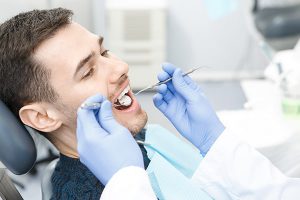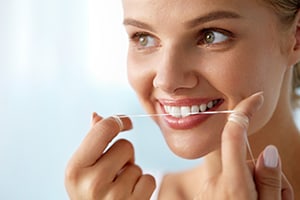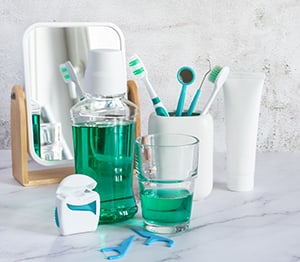Why Is Oral Hygiene So Important?
Gum disease, also called periodontal disease, is the primary cause of tooth loss in adults over the age of 35. And most adults have gum disease to one degree or another. Some people who have serious gum disease aren’t even aware of it.
Periodontal disease and tooth decay are both caused by bacterial plaque. Plaque is a colorless film that sticks to your teeth. It constantly forms on your teeth, but it can be removed with thorough brushing and flossing. If you keep plaque under control, you can prevent most tooth decay and gum disease.
Seeking the care of a qualified dentist is a key part of maintaining good oral hygiene. Our Naperville dentist, David Newkirk, DDS, is committed to providing top-of-the-line care in all areas of dentistry, from cosmetic and restorative to general and preventive treatments.
- Professional Cleanings & Exams
- X-Rays
- Oral Cancer Screening
- Family Dental Care
- Mercury-Free Dentistry
- Frequently Asked Questions
“As a retired dental office manager, I am pretty picky when it comes to my family’s dental care… Dr. Newkirk and his staff are amazing! Everyone is confident, friendly, professional and attentive… If you are looking for a great dentist, you have found him!”
Professional Cleanings & Exams
 Daily brushing and flossing will keep dental calculus (tartar) to a minimum, but won’t remove it. Even if you brush and floss faithfully, you will still accumulate calculus, which can only be removed with a professional cleaning. Our hygienists will be both thorough and gentle as they clear your mouth of harmful bacteria.
Daily brushing and flossing will keep dental calculus (tartar) to a minimum, but won’t remove it. Even if you brush and floss faithfully, you will still accumulate calculus, which can only be removed with a professional cleaning. Our hygienists will be both thorough and gentle as they clear your mouth of harmful bacteria.
During the same appointment, our hygienists can perform a thorough examination of your dental health.
These non-invasive check-ups typically include a search for cavities, inflammation, and other signs of potential dental issues, as well as the use of cutting-edge x-ray technology to screen for more serious concerns.
We generally recommend professional cleanings and exams every six months. If you have gum disease, we may recommend a check-up every three months.
X-Rays
Because state-of-the-art imaging can be very helpful in the diagnostic process, we use only the best-quality x-ray systems at our practice. Our x-rays, which are generally quick and painless, provide Dr. Newkirk and our hygienists with an in-depth view of your teeth, gums, and jawbone. This allows us to efficiently develop a plan for your treatment.
Oral Cancer Screening
Oral cancer, or cancer of the mouth, affects around 50,000 Americans every year. Thankfully, the condition is often treatable, especially when it is diagnosed as early as possible. For this reason, we will perform an x-ray of your entire mouth during your exams in order to detect possible signs of oral cancer and other serious concerns. If you have additional questions about oral cancer, feel free to ask our team at your appointment.
Family Dental Care
Dr. Newkirk and the rest of our team enjoy the opportunity to treat younger and older patients alike. We believe in the importance of bringing children to the dentist to set them on the path toward adopting healthy oral hygiene habits in adulthood. At our family-friendly office, we strive to maintain a warm, welcoming environment for patients of all ages and offer gentle care for both yourself and your loved ones.
Mercury-Free Dentistry
Our dental team’s number one priority is the health and wellness of our patients. Dr. Newkirk is a mercury-free dentist who does not provide dental restorations composed of metal amalgam due to the toxins that can be exposed to the patient when they have their fillings placed. Instead, our premier dental practice offers white fillings made from composite resin since it is considered a safer, stronger, and more natural-looking option when it comes to restoring damaged teeth.
Frequently Asked Questions (FAQ)
What Is the Proper Way to Brush Teeth?
When brushing, dentists agree that a soft brush is the best. The bristles of a soft brush are better able to penetrate the cracks and crevices where gum disease and tooth decay start.
To brush your teeth, position the brush at a 45-degree angle where your gums and teeth meet. Gently move the brush in a circular motion several times using small, gentle strokes. Use light pressure while putting the bristles between the teeth, but not so much pressure that you feel any discomfort.
Use a systematic approach. Start on one side of your mouth and work around. Press on the brush so that the bristles get in all the cracks and spaces. Brush the outside surfaces, then move to the inside.
Next, clean the chewing surfaces of your teeth by using short, gentle strokes. Again, if you have a systematic approach, you won’t miss any surfaces. Try to watch yourself in the mirror to make sure you clean each surface. After you are done, rinse the toothpaste out of your mouth.
If you have any pain while brushing, if brushing makes your gums bleed, or if you have any questions about brushing techniques, feel free to call the office or ask us about it when you have a check-up.
How Do You Floss Your Teeth?
 Gum disease is usually the most serious between the teeth where your toothbrush cannot reach. Flossing is therefore critical to preventing gum disease. However, it is important to develop the proper technique.
Gum disease is usually the most serious between the teeth where your toothbrush cannot reach. Flossing is therefore critical to preventing gum disease. However, it is important to develop the proper technique.
Start with a piece of floss about 18″ long. Lightly wrap most of the floss around the middle finger of one hand. Wrap the rest of the floss around the middle finger of the other hand.
Use your thumb and index finger to grasp the floss. Gently insert the floss between the last two teeth on one side of your mouth. Do not force the floss or try to snap it into place, as this can injure the gum. Bring the floss to the gum line then wrap it into a C-shape against one tooth. Slide it down under the gum until you feel light resistance. Scrape the floss up and down on the side of one tooth. Remove the floss from this tooth space and insert it into the next space. As the floss becomes soiled, turn from one finger to the other to get a fresh section.
Continue moving from tooth to tooth in a systematic manner until you have cleaned all surfaces of each tooth.
When you are done, rinse with water to remove loosened plaque and food particles. Do not be alarmed if during the first week of flossing your gums bleed or are a little sore. This is probably the result of inflammation caused by the bacteria in the plaque. If you floss correctly every day, it should take about two weeks for your gums to heal and the bleeding to stop.
Which Oral Hygiene Products Are Best?
 There are so many products on the market that it may become confusing, and choosing between all the products can be difficult. Here are some suggestions for choosing dental care products that will work for most patients.
There are so many products on the market that it may become confusing, and choosing between all the products can be difficult. Here are some suggestions for choosing dental care products that will work for most patients.
Automatic and high-tech electronic toothbrushes are safe and effective for the majority of patients. Oral irrigators (water spraying devices) will rinse your mouth thoroughly, but will not remove plaque. If you use an irrigator, be sure that you also brush and floss faithfully. We see excellent results with power toothbrushes, especially sonic toothbrushes.
Some toothbrushes have a rubber tip on the handle. This is used to massage the gums after brushing. There are also tiny brushes (interproximal toothbrushes) that clean between your teeth. If these are used improperly you could injure the gums, so be sure to discuss proper use of these brushes with our dentist, Dr. Newkirk.
Fluoride toothpastes and mouth rinses are proven to reduce tooth decay by as much as 40 percent. Remember, these rinses are not recommended for children under six years of age. Tartar control toothpastes will reduce tartar above the gum line, but gum disease starts below the gum line so these products have not been proven to reduce the early stage of gum disease.
Anti-plaque rinses, approved by the American Dental Association, contain agents that may help bring early gum disease under control. Use these in conjunction with brushing and flossing.
More ReviewsProfessionalism, comfort, ease. These three adjectives describe my experience at Dr. Newkirk’s office. From routine cleanings to cavity fills, our service with Dr. Newkirk and his wonderful staff has made our dental care easy to understand and follow. We have have actually had more than 50% fewer cavities following Dr. Newkirk’s care. Also, Dr. Newkirk and his staff go above and beyond caring for their patients. When I had a deep cavity several years ago, Dr. Newkirk was worried that it might flare in the near future. I was scheduled to go on an overseas trip. Dr. Newkirk provided me with the name and number of one of his colleagues in London in case I had trouble. That is invaluable service. I recommend Dr. Newkirk and his office to all!!!!
Deborah Jones
January 04, 2019
How Does Nutrition Affect Oral Health?
Good nutrition plays a large role in your dental health. Brushing and flossing help keep your teeth and gums healthy and strong. However, a balanced diet will help to boost your body’s immune system, leaving you less vulnerable to oral disease.
How often you eat also can have a serious effect on your teeth. And it isn’t just sweets. Any food with carbohydrates in it will promote tooth decay. Crackers, chips, cookies, and pretzels can be very hard on your teeth if you are snacking on them constantly. Foods that stick to your teeth or are slow to dissolve give the acids more time to work on destroying tooth enamel. Each snack causes an acid attack of approximately 20 minutes in duration.
Starchy foods:
- Crackers
- Chips
- Cookies
- Pretzels
Sticky/slow to dissolve foods:
- Granola bars
- Chewy fruit snacks
- Dried fruit
- Hard candy
Sticky and starchy foods are less of a problem when eaten as part of a meal. Saliva production increases at mealtime. Saliva has very effective decay fighting properties: It rinses away food particles, it has buffering compounds in it that neutralize harmful acids, it has antibodies that fight plaque bacteria, and it has minerals that help repair early decay lesions. And a meal only causes one acid attack, while snacking during the day causes repeated acid attacks on your teeth.
If you have any questions about the proper care of your teeth and gums or it is time to schedule your next appointment, please don’t hesitate to give us a call at 630-717-9499, or request an appointment online.